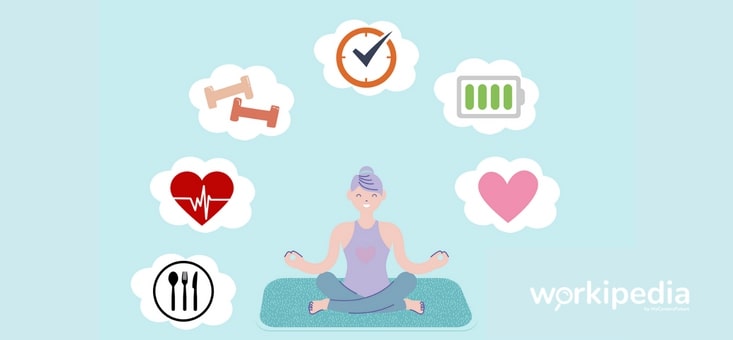If ‘tired’ is the first word that comes to your mind every day when you wake up to go to work, then chances are your work (or workplace) is becoming detrimental to your personal mental health.
Our ‘hustle’ culture can be unforgiving, and lead us to sacrifice our personal well-being intentionally or unintentionally. But that shouldn’t be the case.
It is vital to build wellness at the workplace. While change may not happen overnight, you can start taking small steps to care for your mental health at work.
1. Find your “work-life balance”
Is achieving work-life balance real?
While it sounds ideal, it is not realistic to work towards having a perfect schedule. Aim for something more achievable instead. If there are days where you log more work hours because of peak periods or impending deadlines, be intentional about having more personal time in the days after. Start with using your downtime to find your purpose or figure out what you really want to pursue in life.
Even if what you do at work isn’t your passion, having that balance helps you feel recharged and ready to go to work.
Learn to take breaks in-between work as well. Enjoy your lunch without worrying about your tasks. Even though this is prevalent in Singapore’s work culture, try to avoid talking about work with your colleagues over lunch, unless you absolutely have to.
You can take frequent breathers without compromising on quality and efficiency at work.
A simple way to do this is via the Pomodoro Technique, where you break your working hours into 25-minute chunks separated by 5-minute breaks in between. After working for 25 minutes, take a 5-minute break to recharge, work another 25 minutes, and take another break and repeat it until the end of the day. You can tweak the chunks of time as needed. This allows for increased efficiency, while having more personal time.
Remember, balance is achieved over time, not just in a day or week.
2. Find an environment that works for you
It is human nature to desire a comfortable environment. This often means being surrounded by people you like.
Establishing strong working relationships with your colleagues is important. Nobody wants to be fighting solo battles and/or avoiding office politics every day. Try to build rapport and eventually trust with the people you work with.
The right environment applies to your physical space as well.
Working from home allows you to customise your workspace to your needs. Try to make your workspace feel different when you’re at work and when you’re off the clock. Visual cues through the switching of lights could do the trick. Have bright lighting during work hours, and switch to mood lighting while off work to help you relax. Engage your sense of smell by lighting up scented candles or turn on aroma diffusers in the evening or during the weekends. This signals your brain that it’s time to wind down, allowing you to relax subconsciously.
However, working from home can sometimes blur the lines between work and non-work hours, so you must be disciplined and set boundaries. And of course, working from home if you have kids brings along a different set of considerations.
3. Communicate with your colleagues, including your boss!

It is important that you communicate honestly and openly with the people you work with. Don’t bottle everything within and allow your unhappiness to build. Oftentimes, small misunderstandings between colleagues can fester and lead to conflicts. Nip any potential problems in the bud by talking things out with the people you work with, to create mutual understanding and build trust. Work can be stressful enough, so it helps to have the support of your colleagues.
It’s also ok to tell your boss that you’re unhappy. Initiate open conversations, and always remain calm and professional instead of taking things personally. Try to work together through any issues you might have, whether it’s about job performance/expectations or financial concerns.
If you’ve tried the above tips and still find yourself dissatisfied, perhaps it’s time to consider a change of scenery. If you drag out this decision, you might feel unhappy about going to work and become distracted and disengaged. This is a lose-lose scenario for both you and your company.
Remember to evaluate your priorities and list down your non-negotiables before you start looking for your next job. This process can help you understand the reasons behind your unhappiness and shift the focus back to your career development.
4. Ensure you have a long-term plan
For those who are in the pre-retirement stage of your career, you might be feeling anxious about the impending massive life change. While retirement is an exciting new chapter of your life, to truly live your best life in your golden years, take the Vitamin Cs of ageing healthily:
- Connectivity: Stay connected to the people who bring out the best in you, and vice versa.
- Challenge: Challenge yourself intellectually and physically on regular basis.
- Creativity: Engage in pursuits that drive your creativity
- Charity: Do things that will benefit the wider community
- Curiosity: Be curious and continuously learn
Remember that retiring from work does not mean retiring from life. Seek the right balance between pursuing your purpose and relaxing. If you love your work, continue doing it but on your terms. Work for passion, not for a living.
Without proper financial health, even the best plans can fall apart. Your CPF LIFE monthly payouts can give you the financial peace of mind to do what you want to do without worry. From the day you started working, your retirement savings have been steadily growing. You can continue to make use of CPF’s interest rates and the effects of compound interest to boost your retirement income steadily.
Start building positive habits and cultivate your mental wellness at work – this will positively impact your overall happiness and well-being.
This article is contributed by CPF Board.














